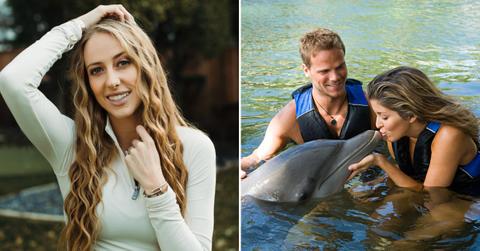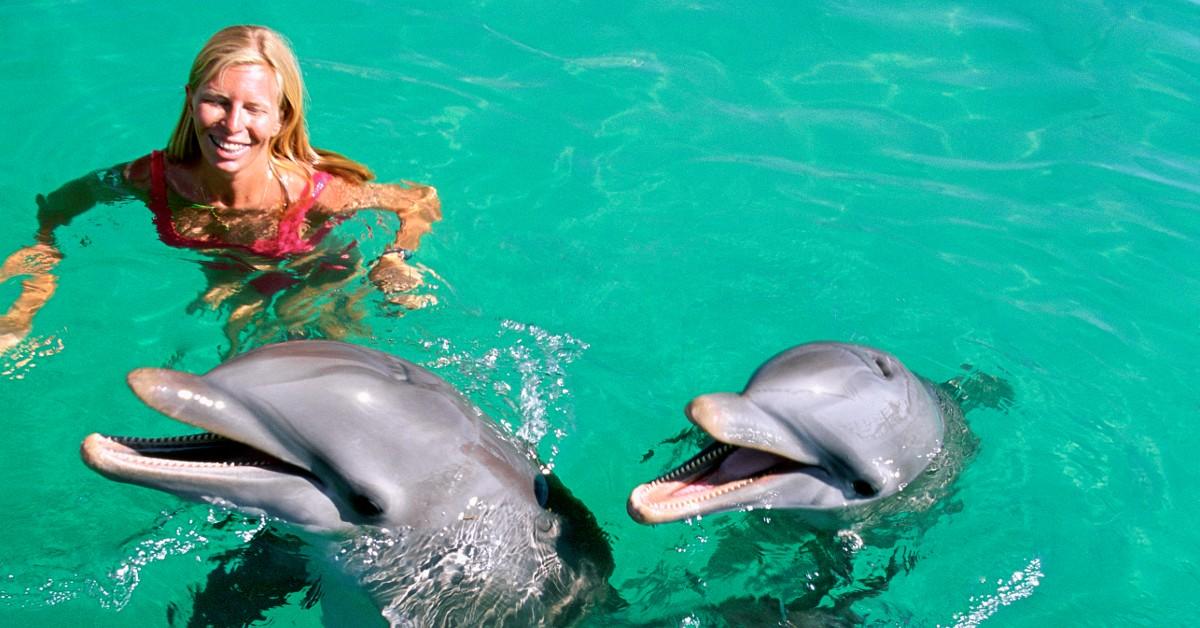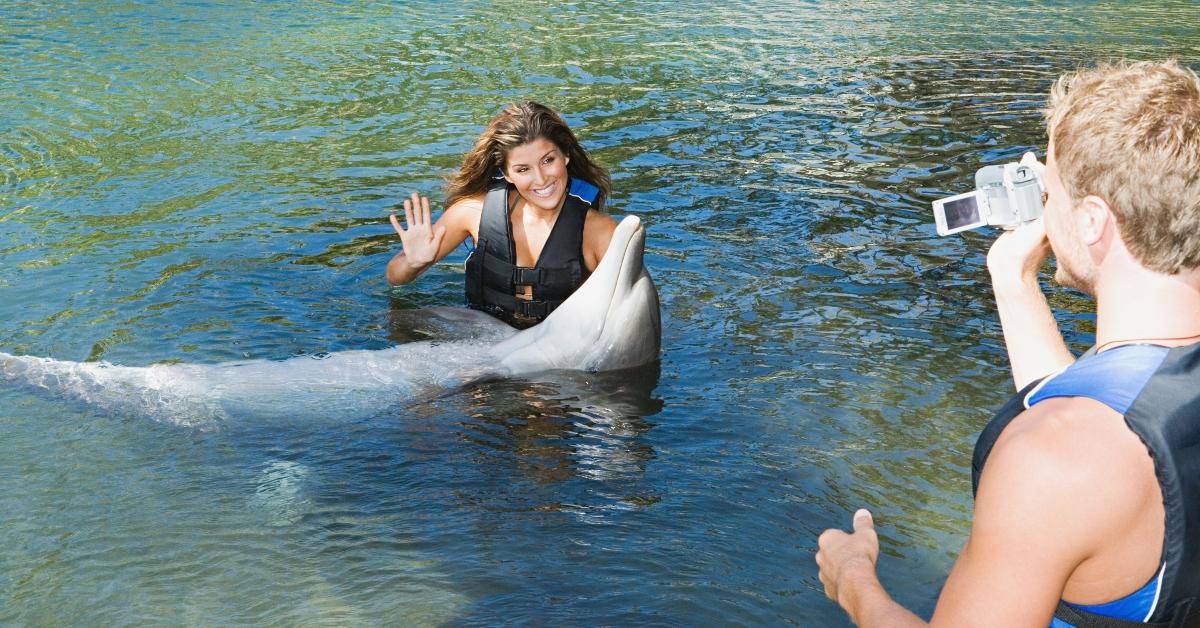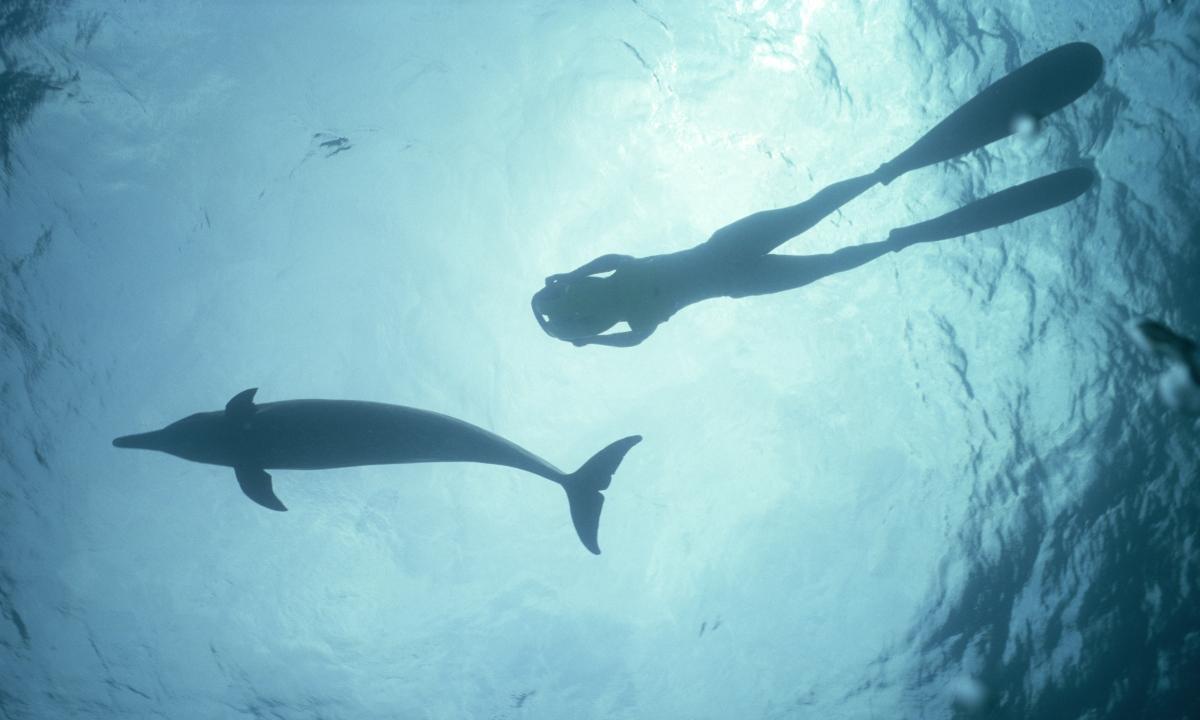Is Swimming With Dolphins OK? Brittany Mahomes in Hot Water For "Snuggling a 400-Pound Dolphin"
Published July 7 2023, 9:11 a.m. ET

Despite their "smiling" faces, cutesy squeals, and friendly reputation, people should be wary before getting close with dolphins. The slippery beasts are sexually aggressive (they've even been deemed the “rapists of the sea"), they form gangs and commit infanticide, per The Atlantic, and have been known to attack humans, though American Oceans points out that "these incidents are relatively rare and are often the result of human interaction with wild animals."
Considering we stuff them in claustrophobic glass tanks, bribe them to perform circus tricks, and force them to interact with self-indulgent tourists for cheesy photo shoots, it's hard to blame the aquatic mammals for pushing back.
After a July 2023 trip to Hawaii, Brittany Mahomes — Kansas City Current co-owner and wife of NFL star Patrick Mahomes — shared a few pics alongside what appears to be a common bottlenose dolphin. "Ever snuggled a 400-pound dolphin?" she captioned the Instagram post, which featured her and her daughter, Sterling Skye, cozying up to the creature.
Though Mahomes surely posted her vacay snapshots with good intentions, fans and animals rights activists alike — including controversial animal rights organization PETA (People for the Ethical Treatment of Animals) — jumped down her throat in the comment section, some calling the encounter "clueless," "disgusting," and "animal cruelty," per The New York Post. Naturally, she removed the post.
This begs the question, can swimming with dolphins ever be ethical? Are dolphin meet-and-greets, so to speak, just sadistic entertainment for overstimulated humans? Let's dive on into this touchy subject.

Is swimming with dolphins ethical? PETA says absolutely not.
“We know you love companion animals, but we hope to see you extend your compassion to marine life too,” the animal rights organization commented on Mahomes' now-deleted post. “In the ocean, dolphins swim up to 60 miles each day, but when used for entertainment, they’re confined to small tanks or pools.”
PETA went on to highlight the disturbing consequences of "extreme" dolphin captivity.
“Many dolphins develop painful conditions, such as stomach ulcers, and some die prematurely from the stressful conditions of extreme captivity. Not to mention, many illnesses can be passed from dolphins to human visitors, including viral, fungal, and bacterial infections such as salmonella,” PETA continued.
Additionally, in an article titled "If You Love Dolphins, Don’t Ever Pay to Swim With Them," PETA stated that young dolphins, even babies, "are torn away from their families in the wild" and are sometimes "slaughtered during the capture process and sold as meat to unsuspecting consumers." More specifically, dolphins who are considered "less attractive" are the ones put on the chopping block, literally.
Making dolphins "adapt to an alien world" is associated with shortened lifespans, unnatural UV radiation exposure and heatstroke (wild dolphins spend just 10 to 20 percent of their time at the surface, per the Humane Society of the United States), forced isolation, food deprivation (especially when being trained to perform tricks), sudden death, self-harm, and even insanity, as their innate echolocation navigation instincts are disrupted in a tiny tank.
And when it comes to touch tanks and up-close attractions, just think about it; would you want a swarm of grabby strangers invading your limited personal space (aka prison cell) at any given moment? Didn't think so.
What about dolphin-assisted therapy (DAT)? Petting a blubbery mammal is surely beneficial — dare we say healing — for a variety of patients with physical and/or mental disabilities, right?
Despite many programs pushing holistic bliss (a Turkish program even claims dolphin therapy helped awaken a child from "a vegetative state"), Emory University-based dolphin and whale researcher Lori Marino firmly stated that "dolphin-assisted therapy is not a valid treatment for any disorder." Plus, regarding young patients, “injury is a very real possibility when you place a child in a tank with a 400-pound wild animal that may be traumatized from being captured.”

Swimming with dolphins is seemingly only ethical when it occurs by chance and from a distance.
The odds of a chance encounter with a wild dolphin are admittedly slim, but if it happens while you're out shredding waves or deep-sea diving, appreciate the miraculous experience and swiftly back away.
Specifically referring to surprise encounters with wild spinner dolphins, the National Oceanic and Atmospheric Administration strongly encourages people not to "engage, pursue, or otherwise interact with the dolphin, and take immediate steps to move away."
"Many of their behaviors are often misinterpreted as 'friendly' when they actually are, in fact, signs of disturbance or aggression," the scientific agency explained.

The Animal Welfare Institute said it best: "Cetaceans are wild animals with no particular interest in or connection to terrestrial mammals, including humans. Not harming them sometimes means leaving them alone."
Perhaps we should all just stick to watching Animal Planet.